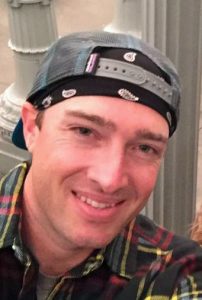Last March, I spoke at a League of Women Voters of Butte County forum having to do with public access to law enforcement records.

Chico Police Chief Mike O’Brien
That Sunshine Week forum, which included Butte County Sheriff Kory Honea and police reformers Emily Alma and Margaret Swick, gave me an opportunity to vent a bit about the most secretive public agency I’ve dealt with as a journalist: the city of Chico.
At the forum I said something that, if anything, is even truer today: Chico city government has no respect for the people’s right to know.
That’s been the case when liberals have controlled the City Council; it’s been true when conservatives had the majority. It was true before the city quit having an on-staff city attorney in 2014. But the secrecy has been taken to new dimensions since Chico began renting legal services from a law firm based near Los Angeles. The firm, Alvarez-Glasman & Colvin, is practiced at keeping what should be public information hidden from Chico’s citizens. One example I cited at the forum was the contrived City Hall secrecy around Chico police officers’ gun-buying — at public expense but for the private ownership of the officers — at a gun shop owned by two Chico cops.
At the time of the forum, both the Butte County Sheriff’s Office and the Chico Police Department were denying requests made under Senate Bill 1421, which opens up most law enforcement records on shootings and certain types of misconduct to public scrutiny. This stonewalling was largely based on a police unions-concocted fiction that the law wasn’t intended to be retroactive prior to its Jan. 1, 2019, effective date.
In August, after courts had affirmed the retroactivity of SB1421, ChicoSol intern Alex Grant and Editor Leslie Layton sent the same basic letter to the city of Chico and the county of Butte seeking information under the new law. Both agencies promised to produce the requested documents. As it turned out, only the county really meant it.
Chico’s response arrived in October, a bit after the county’s, and was a mound of paperwork that purportedly regards the 2017 police shootings of Desmond Phillips and Tyler Rushing. Taken as whole, it’s a head-scratching potpourri of materials that bears little relation to what was asked for by ChicoSol journalists and what the public is entitled to see.
In its Phillips case response, Chico coughed up a total of 120 pages, of which 80 pages (two-thirds) were merely Chico PD policies, all of them easily obtainable without the need of a public records request.
That left just 40 pages that weren’t department policies, almost none having to do with the night Phillips, a 25-year-old black man in mental crisis, was riddled with bullets. Eleven pages dealt with a mental health call involving Phillips that occurred 2½ months before he was killed in his own living room on March 17, 2017, by officers Alex Fliehr and Jeremy Gagnebin.

Together, the two young officers fired 16 rounds within four seconds, hitting Phillips 11 times. One of the bullets – a particularly devastating one – was fired into Phillips’ body from a sharply downward angle. A police expert hired by attorneys for the Phillips family wrote that the killing appeared to be a “panic shooting” by Fliehr and a “sympathy shooting” by Gagnebin. Butte County District Attorney Mike Ramsey quickly ruled the killing legally justified.
Four months after the Phillips killing, Fliehr thought he saw the severely wounded Tyler Rushing move and proceeded to shoot him with a stun gun. At the time, Rushing lay on his stomach in his own blood and was either unconscious or already dead. No other officer saw Rushing move, and body camera video proved that he didn’t.

Tyler Rushing
In contrast to Chico PD, the Butte County Sheriff’s Office provided hundreds of pages of relevant materials to ChicoSol — none of which were department policies – about its 2018 killing of Myra Micalizio. At least so far as SB 1421 is concerned, the sheriff’s office appears to be a law enforcement agency that takes its own adherence to the law seriously. The Chico Police Department, in stark contrast, is willing to brazenly violate that law to keep the public from knowing more about how its officers killed Desmond Phillips. Each agency’s response says a good deal about the honesty of its leadership – and about the true nature of its legal representation.
The most recent letter of lawyerly obstruction to ChicoSol from the city’s hired guns, very liberally paraphrased and condensed, went something like this: “We think you have everything you asked for. We can look for more records but with the holidays and the workload and all it won’t be until sometime in January or so.”

Oh, c’mon. Just go to the damn file that contains the ream of investigative reports that were written about the Phillips killing, make any required redactions of witness information, attach the redacted reports to an email, and send them to ChicoSol. That’s what the county has already done, months ago, and, to quote George Costanza, “it really didn’t take very long either.”
Among the paperwork provided to ChicoSol by the Sheriff’s Office were the following:
—Coroner and medical examiner reports;
—Investigative reports conducted by sheriff’s officers for internal review;
—Investigative reports conducted by officers from outside the sheriff’s office for criminal review;
—Reports on evidence from the scene, including Micalizio’s vehicle, her belongings, and the location of bullets and shell casings;
—Written statements from witnesses to the shooting.
As a journalist who prefers to dig below the surface, I know that investigative reports may provide specific facts and details that make stories more complete and interesting. But not only that. These reports can uncover some inconvenient truths for the tidy little narratives often put out by authorities for public consumption.
For example, the official storyline was that Micalizio, who was obviously in mental crisis when killed, had disobeyed shouted orders to stop and tried to back her vehicle over deputy Charles Lair, who then shot her five times in the back through a side window. Lair was not hurt. Micalizio was accused of “attempted murder.”

As I’ve written about in more detail, Micalizio had gone out of her way to try to help a California Highway Patrol officer almost exactly 48 hours before she was shot dead. In parting that day, she told the officer to “stay safe.” The encounter, which the officer described as extraordinary, showed Micalizio’s reverent attitude toward law enforcement. There was no mention of the encounter in DA Ramsey’s quite extensive official report that found no criminal violations by deputies Lair and Mary Barker, the latter shooting wildly at Micalizio, including into an occupied trailer home.
Another fact not previously reported – and this too was absent from the information Ramsey allowed the public to know – has bugged me ever since I found it buried in one of those investigative reports: In being killed, Myra Micalizio bit off part of her tongue. That’s according to a statement to detectives by deputy Barker.
Consider how terrified someone must be to bite her own tongue in two. It’s a terror, I’m supposing, that is beyond the sane person’s ability to fathom. And it’s a terror that rendered Myra mentally disabled when killed in the name of Butte County.
Among the dissimilarities in the city’s and county’s responses are what’s shown of their internal affairs investigations. The county’s “bottom line” (Lair and Barker did nothing wrong) in the Micalizio killing is detailed in a three-page memorandum from an internal affairs sergeant to Sheriff Honea.
While it’s important to recognize that such investigations in Butte County, whether criminal or departmental, are conducted of, by and mostly for law enforcement personnel, the memo at least sets forth some basis for its findings.
The city of Chico, in contrast, provided only a one-page memorandum sent to Fliehr, the officer who fired at Desmond Phillips first and didn’t stop until he’d squeezed the trigger on his Glock full of hollow-point rounds nine times at close range. That Nov. 17, 2017, memo is from Deputy Police Chief Matt Madden, who, one supposes, is in line to succeed the increasingly uncommunicative Mike O’Brien as police chief. An identical single-page document was prepared for officer Gagnebin, who shot at Phillips seven times.
Madden’s memo lists the titles of nine different sections of Chico PD policies the officers could have violated, ending with this grammar-challenged sentence: “The investigation concluded that the above allegations are EXONERATED” (the word was bolded, capped and underlined.) Normally, “people,” not “allegations,” are the ones “exonerated.” That aside, it’s impossible to know which specific allegations were supposedly “investigated.”
Deputy Chief Madden’s memos to Fliehr and Gagnebin conclude as follows: “There will be no record of these allegations entered into your personnel file.”
And thus it was so ordered that the death of Desmond Phillips would be forever scrubbed from the official work histories of those who ended his young life so suddenly and so shockingly.
Whatever else might be said, it was an act consistent for a public agency with no respect for the people’s right to know.
Dave Waddell is a contributor to ChicoSol covering law enforcement in Butte County.

I feel that the public is not only left uninformed but also possibly in danger as my son joey was murdered in 03/17 and the case is still open with the demons responsible free amongst the public yet the majority of the public never heard of my sons murder
Thank you, Dave Waddell and the ChicoSol news team for another important article exposing the secretive world of the Chico Police Department. No other media outlet will do anything but compliment the CPD and the chief. The city council members offer only congratulations to the chief, never a criticism. The lack of transparency is evident. What is the chief hiding? What are he and his team afraid to disclose? SB1421, effective January 1, 2019, is a California law that dramatically improved the ability of the public and the press to obtain previously highly confidential police personnel records. Records are to be made available to the press and public relating to use-of-force incidents, sexual assaults, and acts of dishonesty. Previously, such records were only available through legal action. SB1421 is now the law. Records relating to the report, investigation or findings of an incident involving the discharge of a firearm at a person by a “peace officer” are to be disclosed upon request. A direct quote from the wording in the legislation is this: The public has a strong, compelling interest in law enforcement transparency because it is essential to having a just and democratic society.
These and every other violent law enforcement involved “CRIME” is brushed under the rug by Butte County officials. This in turn leave our community in the dark. The system in Butte County is totally UNJUST and in my opinion EVIL. If you wouldn’t have paid an attorney these too would have been shined on. The only way anyone can get any kind of justice here is if they pay an Attorney to represent them. So if you’re poor and not able to afford representation your chances of justice here are basically non-existent. I don’t think it’s very constructive when these illegal and out right over aggressive actions by law enforcement are investigated and findings are conducted by their own people. It’s a bias interpretation of these cases. Thank you for digging and showing the public how underhanded Butte County and it’s law enforcement are! This local justice system needs an overhaul.